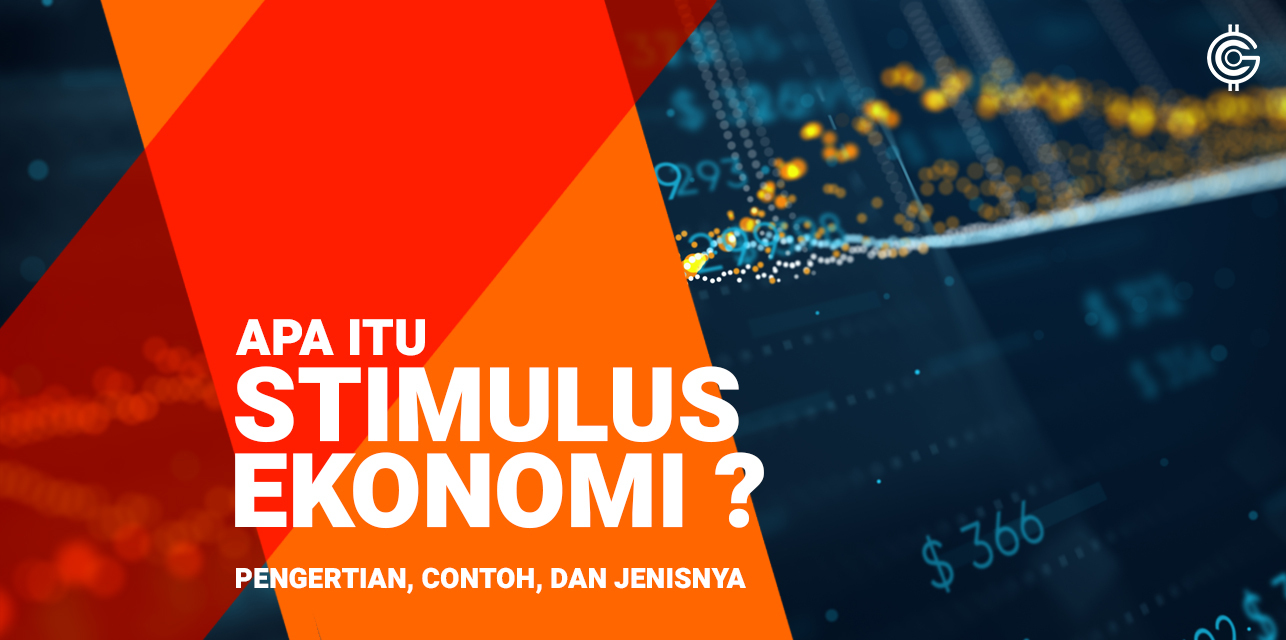What is stimulus? Surely you have heard the term stimulus when you are reading some articles or news information about the economy. Literally, stimulus does mean the stimulation or encouragement of a person or something to give an expected reaction or response. For more details, see the explanation of the definition and types of stimulus below.
Table of Contents
Full explanation of stimulus
As mentioned earlier, the word stimulus literally means a stimulus or a push. However, do you know the origin of the word stimulus? The stimulus itself comes from the English language that was first used in the early Middle Ages. In Indonesian, the word stimulus is included in the noun class category (noun). The word stimulus also has other meanings besides stimulus or encouragement, namely invitation, drive, and encouragement.
The term stimulus is widely used in articles or information news to explain the economic crisis. An economic crisis is a condition in which a country experiences a very drastic economic downturn. This economic crisis can occur due to disasters, excessive state debt, undeveloped economic development, and high inflation rates.
The government then issued a lockdown order that made the economy worse. Therefore, the government decided to provide stimulus funds which are divided and divided into 3 types of stimulus to be able to continue to encourage economic growth.
Currently, several countries, especially Indonesia, are experiencing a global economic crisis caused by the COVID-19 virus outbreak. With the presence of this Corona virus outbreak, the government has imposed a ban on several tourism sectors, travel abroad, and even a ban on offline trading. Therefore, various logistics, trade, and tourism activities are three of the various sectors that have been severely affected by this pandemic.
From the trade sector, for example. Export and import actors will experience a very significant economic crisis. They will have difficulties in obtaining raw materials and also getting capital goods. In addition, the average amount of production will decrease and the prices of goods will increase sharply due to the scarce or limited number of goods. This crisis condition lasted for a long time and was getting worse.
It does not stop there, the outbreak that continues to spread widely makes the government have to provide a large amount of money to carry out treatment, provide medicines, and provide adequate facilities to reduce the number of victims of the spread.
Stimulus funds are a number of emergency allocation funds used by the government to restore the national economy. Usually, the stimulus funds issued by the state range from billions to trillions. Indonesia itself is recorded to have spent more than US$ 8 trillion or more than 10% of world GDP.
These three types of economic stimulus are fiscal, non-fiscal, and external stimulus. One stimulus and another has a very close relationship and they both aim to support various business and business activities, taxes, and so on. An in-depth and thorough explanation of these three stimuli will be discussed as follows.
Economic stimulus
What is economic stimulus? Stimulus in the economic sector is a word used to refer to government efforts that use monetary and fiscal policies in order to stimulate or encourage the economy for the welfare of the people.
If a country experiences a major disaster, outbreak or other extraordinary events that have a major impact on various sectors of people's lives, the government must issue economic policies to help the community's economy.
As for Medium Enterprises, they are those who have a net worth of more than IDR 500 million to IDR 10 billion and annual sales of more than IDR 2.5 billion to IDR 50 billion. Micro, Small and medium business actors must have felt the results of the stimulus policy from the government.
Economic stimulus can be issued by the ministry of economy with the note that the government has sufficient funds because in the stimulus program there will certainly be an increase in spending and also tax cuts.
As we know, as a result of the spread of the coronavirus which has greatly affected the economy of the Indonesian people, the government through President Jokowi has provided economic stimulus since last year. The economic stimulus includes 3 sectors, Small, Micro and Medium Enterprises (MSMEs). What are the different types of Small, Micro, and Medium Enterprises? The difference between the three types of businesses lies in their total net worth and annual sales results.
Small Businesses have a net worth of IDR 50 - IDR 500 million with annual sales of more than IDR 300 million to IDR 2.5 billion. For the net worth of Micro Enterprises is at most IDR 50 million and the annual sales result is approximately IDR 300 million.
Fiscal stimulus
In addition to the stimulus announced for the 3 types of businesses, there are also fiscal stimuli issued by the government. What is fiscal stimulus? This stimulus refers to the government's economic policy by reducing the amount of taxes or other financial requirements to increase people's economic growth.
This fiscal stimulus policy has been implemented since 2020. The fiscal stimulus policies implemented by the Indonesian government include:
- Hotel and restaurant tax exemption for 6 months applied to 10 tourist destinations in 33 cities or districts.
- The provision of compensation and insurance to medical personnel who handle Covid-19 patients is also one of the fiscal stimulus policies in 2020.
- Income Tax Relaxation (PPh 21) which is borne by the government 100% on workers' income with a nominal amount borne by the government of Rp8.6 trillion. This policy is intended for employees who work in the manufacturing or processing sector who earn less than IDR 200 million.
- Relaxation of Import Income Tax (PPh22) for 19 manufacturing industry sectors with a large delay of IDR 8.15 trillion. This tax exemption policy is implemented to provide cash and flow space to replace switching costs related to changes in costs from the country of origin of imported products.
- Relaxation of corporate income tax 25 in the form of a 30% discount for 19 manufacturing industry sectors that have been selected with a total delay of IDR 4.2 trillion.
- The acceleration of distribution for social assistance, subsidies for public housing and the implementation of pre-employment cards is also one of the fiscal subsidy policies implemented in the midst of the coronavirus outbreak.
- Relaxation of VAT restitution for exporting and non-exporting companies. For exporters, VAT restitution is accelerated without initial audit and without restrictions. Meanwhile, for non-exporters, it is limited to IDR 5 billion. The amount of restitution reached IDR 1.97 trillion. The existence of this policy is expected to maximize liquidity from taxpayers.
In 2021, the government continues to try to accelerate economic recovery. However, these efforts are carried out in tandem with countering the spread of Covid-19 which is the biggest challenge today. The next stimulus is non-fiscal stimulus.
To save the manufacturing industry and national trade during this pandemic, the Indonesian government has issued a number of non-fiscal policies. In addition, non-fiscal stimulus aims not only to increase competitiveness but also to launch export activities. Some of the non-fiscal stimulus policies issued by the government include the following:
- Acceleration of the import and export process for entrepreneurs who have a good reputation.
- Simplification and reduction of the number of export bans and restrictions carried out for smooth exports and increase the competitiveness of domestic products, including export tariffs for health certificates for 749 HS code commodities (443 fish commodities and 306 financial industry products)
- Simplification and reduction of strategic food raw materials for the 1022 code include sugar, salt, flour, corn, potatoes, and duplication of imported products such as animals and horticulture.
- Increasing the pace of the export and import sectors.
- Providing supervision that can be done through the development of NLE which is also part of this policy.
External stimulus
Talking about the economy, especially Indonesia, the Jokowi administration is faced with extraordinary challenges because it has to face a difficult situation in the midst of the Covid-19 pandemic. Indonesia's economic growth has declined since 2011 and only slightly increased by 5.06% in 2014. There are two factors that are the main causes of the decline of Indonesia's economic cycle. The first cause is external stimulus. Then what is an external stimulus? External stimulus means that external factors encourage the decline of Indonesia's economic cycle. Some of these external factors include:
- The slowdown in economic growth experienced by China. As the world's most populous country, China is the largest country with stable economic conditions compared to other countries in the Asia-Pacific. With China's slowing economic growth, it will automatically slow down the overall economic recovery. In addition, exports and imports have also declined which will certainly affect global trade.
- Reduced economic stimulus from the United States. The spread of the COVID-19 virus has had a major impact on all countries in the world, including the United States. This superpower also experienced a considerable economic downturn during this pandemic. The U.S. economic recovery prompted the Federal Reserve to tighten monetary policy, which would ultimately result in foreign capital outflows from developing countries, including Indonesia
- The normalization policy has just begun.
- Declining prices of agricultural and mining commodities in the global market. Since the outbreak of the coronavirus, the price of food commodities in the world market has decreased. Several agricultural commodities such as grains, dairy products, and vegetable oils saw a decrease in prices. Likewise with the prices of mining commodities such as palladium, platinum, and copper.
Internal stimulus
In addition to external stimulus factors, there are also internal stimulus factors that also play a role in economic growth. What is an internal stimulus? Internal stimulus is a driving factor from within that affects a country's economic cycle. Internal stimulus that affects the decline in economic growth, for example Indonesia, among others is the swelling of the current account deficit accompanied by a decrease in the effectiveness of government policies and programs. This is indeed common in developing countries.
The deficit occurred due to factors related to the structural information of the Indonesian economy. These factors also often cause an unbalanced willingness and ability to build or a gap.
External and internal stimulus are two factors that have a great influence on a country's economic growth. The government must recognize the causes of the decline in economic growth in the country so that it can immediately make a decision to issue policies such as issuing economic stimulus.
Stimulus funds
In discussing economic stimulus, there is also a term called stimulus check. What is a stimulus check? A stimulus check is a check sent or given to taxpayers by the government. The existence of this check stimulus aims to stimulate the economy by providing more money for taxpayers.
With the provision of the check stimulus, the government hopes to help economic activities to continue and reduce the burden on taxpayers. Taxpayers receive this money in order to increase consumption power and boost income for resellers and business actors.
The stimulus fund in the form of checks is given to those affected by disease outbreaks, disasters, or if the country experiences deteriorating economic conditions. Direct Cash Assistance (BLT) is one example of a check stimulus implemented in Indonesia.
One of the BLTs given was IDR 2.4 million in cash given to MSME actors who felt the impact of the coronavirus pandemic.
Conclusion
Now you already know what a stimulus is. Lately, we often hear or read the word stimulus in articles or economic news in all media. Economic stimulus is an economic policy that is commonly carried out by the government of a country. This stimulus aims to encourage economic growth and maintain community welfare in the midst of a difficult situation caused by a disaster, outbreak or other extraordinary events.
In addition, the Indonesian government through the Ministry of Finance also issued three economic stimulus policies, namely fiscal, non-fiscal, and financial sector stimulus. In general, fiscal stimulus is the government's economic policy by reducing the amount of taxes or other financial requirements to increase people's economic growth.
Economic stimulus is applied in several different forms. In Indonesia itself, the government issued several forms of economic stimulus policies in 2020 amid the outbreak of the COVID-19 virus throughout the country. There are stimuli given to many micro, small, and medium entrepreneurs in the form of fund flows to help their business continuity.
Meanwhile, non-fiscal stimulus is a stimulus issued to save the manufacturing industry and national trade. With the issuance of the economic stimulus policy, the government hopes to continue to maintain the economic stability of the community in the midst of this difficult pandemic period.
The decline in Indonesia's economic cycle growth is influenced by several factors, both external and internal. External and internal stimulus are two factors that have a great influence on a country's economic growth. Ready or not, the government must prepare steps and strategies to face economic challenges and problems in the midst of this pandemic.
Register here to get maximum trading profits, so it's a profitable opportunity!

 Last:
Last: 







